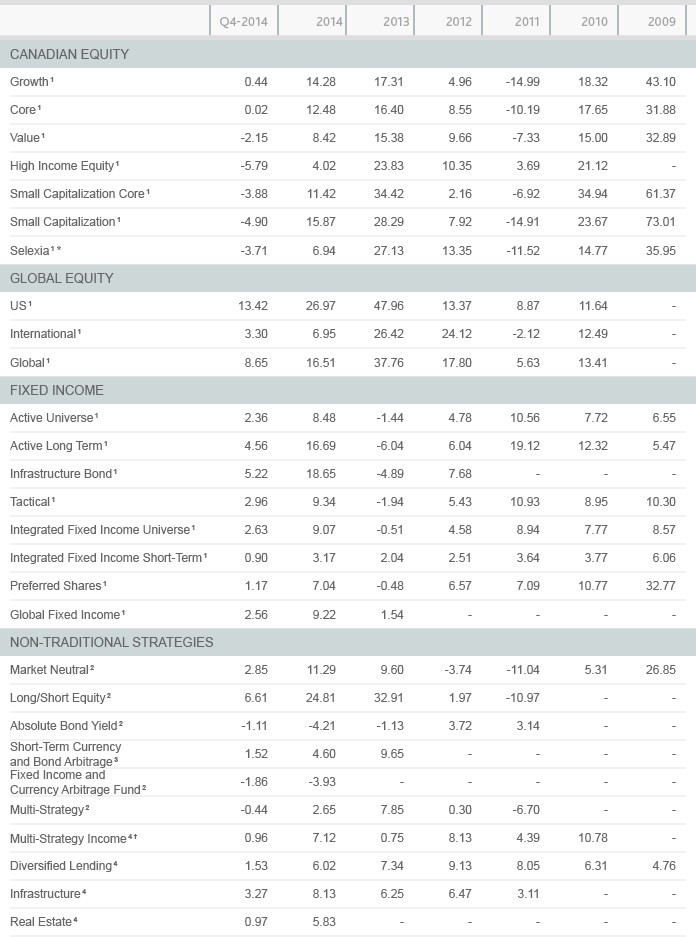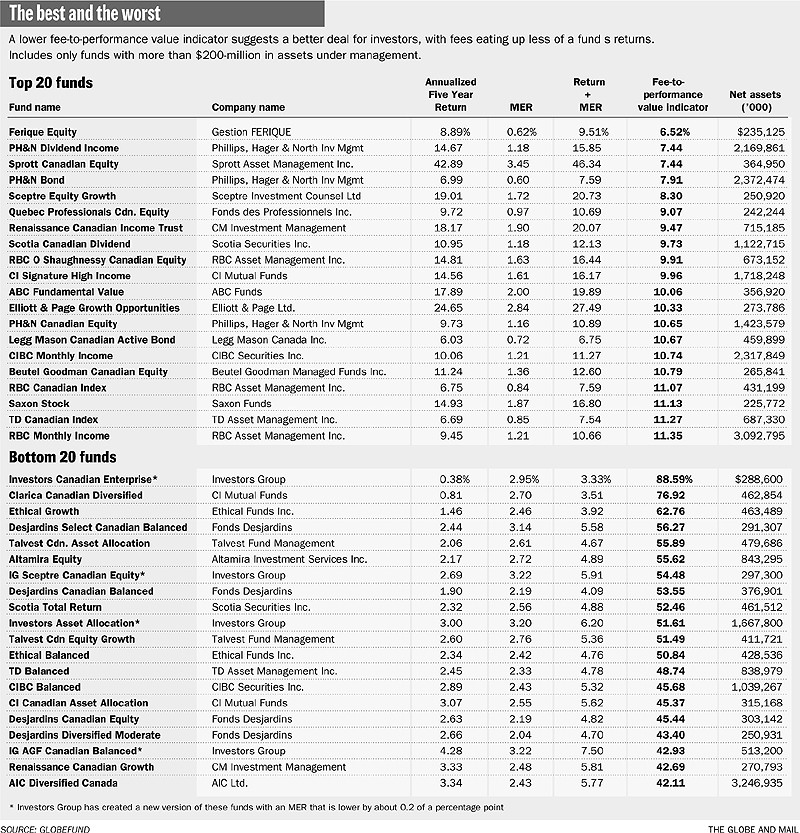Gross Performance For Mutual Funds
Post on: 21 Июнь, 2015 No Comment

Should mutual fund investors judge performance after fees, or should they look to the absolute performance the way institutional investors do? After fee performance is the norm for the industry because nobody actually gets the raw, fee-free returns from a manager’s security selection, but there are times when that performance does matter.
Institutional investors use gross performance because they typically negotiate the fees they’re going to pay. Retail investors don’t have that kind of bargaining power, so it’s immaterial to most.
Another reason institutional investors like gross performance numbers is it lets them compare managers without the distortion that fees create. If two managers have equal skills, but one charges 1.5% and the other charges .50%, all you need to know is that you should hire the cheaper manager. If skills wildly diverge, though, you want to see the gross numbers, if only for comparison sake. Then factor the fees back in to decide if a more skillful manager is worth the cost (though oftentimes the guy with skill is cheaper).
Our panel of mutual fund experts discuss these issues below.
The Forbes Mutual Fund Panelists are:
Daniel P. Wiener, editor of Independent Adviser for Vanguard Investors and CEO of Adviser Investments .
Adam Bold, founder and chief investment officer of the Mutual Fund Store .
Richard Gates, portfolio manager for TFS Capital .
Laura Corsell, an attorney with Montgomery, McCracken, Walker & Rhoads specializing in mutual funds, investment management, regulation and compliance.
James Lowell, editor of Fidelity Investor . The Forbes ETF Advisor, ETF Trader and The Rankings Service .
Fees, Before and After
Corsell. I start with three realities: (1) an investment in a mutual fund is, in essence, the purchase of an investment advisory service; (2) the actual quality of the service depends on the ability of the portfolio manager to pick investments in accordance with the applicable mandate and to affect securities transactions efficiently and cost-effectively; and (3) both “stock picking” (pardon the short-hand, indexers) and effective trading are baked into the performance achieved by the portfolio manager BEFORE taking into account expenses, such as the advisory, administration and distribution fees.
If you accept the above notions, why shouldn’t an investor be permitted to see the quality of the service–the manager’s actual or gross performance–and, separately, its price tag–the expense ratio of the fund involved? Would such a presentation help make an investment decision less “black box” and more like an consumer decision–quality versus price?
The traditional position is that performance must be net of fees so that competing funds can be compared on an “apples to apples” basis. Again, three points are relevant: The most common relative measure of the actual performance are the several market indexes–the S&P, the Russells, the Wilshires, etc. All are unmanaged indexes designed to reflect the market without adjusting for expenses. Second, institutional investors routinely request gross performance presentations in requests for proposals. Institutions also rely on commercially available actual/gross performance statistics available through organizations that compile performance stats provided to them by investment firms–again, on an unadjusted for expenses basis. Finally, if all mutual funds backed out their expense ratios and provided gross performance, the “apples” comparison would be preserved.
Finally, I’ll note that my proposal would be that gross performance in fund advertising be accompanied not only by the fund’s expense ratio but also by the net number.
Contrary views welcome–
Gates. If I were an investor, I would be inclined to almost exclusively look at the net performance. In other words, I would not care too much about fees or gross performance. Rather, the most important thing to me is what ended up in my pocket.
My guess is that institutional investors ask for gross performance because they oftentimes like to negotiate on the fees. Mutual funds do not offer retail investors that flexibility.

Corsell. Rich’s comment is true, as far as it goes, and funds, of course, don’t negotiate fees. But managers can and do use fee waivers that (perhaps without design) mask their skill. It seems peculiar that, in an environment that favors the unbundling of expenses and separate disclosure of embedded expenses, investment quality is out of focus.
I should also say that I’m in favor of repealing 12(b)-1 (distribution) and 28(e) (the rule that permits soft dollars) as well–both, in my view, skew the ability of boards and investors alike to evaluate investment services and costs. But maybe that is a question for another day.
Wiener. Unless I’m missing the point here, why can’t you simply take the net return, subtract the operating expenses and get the gross return? Not sure what Laura’s trying to find that isn’t patently obvious in the numbers.
Gates. Yeah–good point. I think that could give investors a very good estimate for most funds. But, perhaps it might get tricky in some cases, such as when a fund implements a fulcrum fee, when an adviser absorbs some of the operating expenses for a fund, when a fund shorts securities and the dividend payments are treated as an expense, etc.
Laura, what do you think about Dan’s suggestion?
Corsell. Current disclosure policy is based on the notion that investors should have line item disclosure of fund fees and expenses; most of this information appears in tables required to appear in the prospectus. The point I am making is that the same level of transparency should be applied to disclosure of investment track records. Mutual funds aren’t the only way to access investment advisory services; access to actual performance information gives investors a way to compare funds to one another as well as a way to compare funds to other options.
Access to actual performance also brings the choice of investment options a little closer to other consumer choices: a chance to evaluate quality and price. Such access would also level a part of the informational playing field for retail investor relative to institutions.
Finally, and as you may be aware, some retirement platforms offer separate accounts as investment options; net performance information relating to these options does not reflect the actual expenses associated with the account but rather a model fee. This makes it difficult for an investor to compare either past performance or expenses. So, for simplicity’s sake, I am suggesting only this: Give all investors access to the single item that is common to all investments: the actual performance.
Wiener. Laura, you make a point that transparency should be applied to disclosure of investment track records. I couldn’t agree more. But if what you are truly after is transparency, then it seems a much, much larger issue is that of changing managers. I can’t recall seeing much, if anything, in the way of a fund disclosing that its long-term performance was the result of one, then another, then maybe a third manager over a 10-year period. At a minimum, a chart showing when managers changed, and an explanation of whether it’s a member of the team, or a whole new face, or new firm, should be included. See the following as an example.














